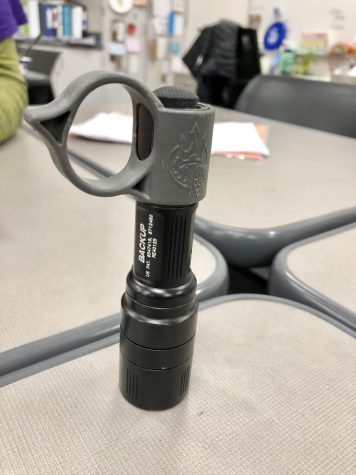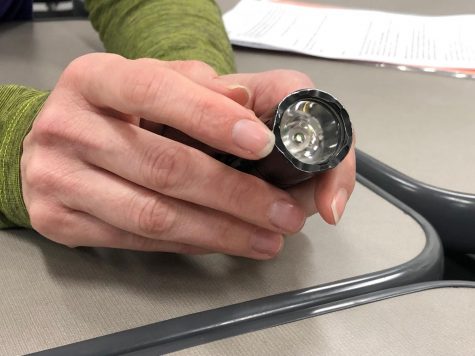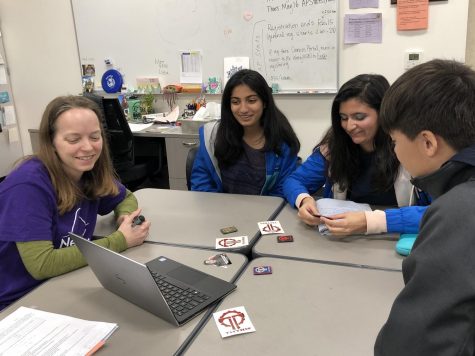Full-time teacher and business owner Debbie Frazier
Exploring AP CS and Statistics teacher Debbie Frazier’s business “Thyrm”
March 19, 2019
Last October, AP CS and Statistics teacher Debbie Frazier was looking to hire help for her business, Thyrm, an American company that creates gears for professionals that deal with guns in their lines of work. She asked her friend who she thought would be perfect for customer service. At first, her friend denied the offer and said, “I don’t like guns.” Frazier responded, “We don’t sell guns.”
After working with the company for a while, Frazier’s friend apologized for her initial reaction and is still with the company today.
Thyrm was founded by Frazier and her husband in 2013. Contrary to what many think when they open the website for the first time, it does not manufacture guns. One of their most popular products is the Switchback, a flashlight ring that secures flashlights to firearms.

Through these products, Thyrm aims to portray the core principle of American innovation — to help people do their jobs.
The idea for the first Thyrm product actually sprung up when Frazier’s husband was competing at a National shooting competition held by the International Defensive Pistol Association (IDPA). The competitors had to use flashlights because it was a low-light stage, which he found difficult because back in California, the weather and lighting was always pleasant for shooting.
“[Being in the] Midwest in the middle of winter, he went from shooting at the professional level to being the worst shooter ever,” Frazier said.
From her husband’s experiences at the competition sprung the idea of Thyrm. The purpose was to help professionals in their jobs by providing them with products such as the Switchback. If Frazier’s husband had trouble shooting in low-light scenarios, professionals such as police must also have trouble. So, the flashlight ring was born in the family garage.
One of the problems that Frazier runs into is how she can show that this business is trustworthy, with neither of the founders being from the military or police force. Frazier and her husband competed in amateur international competitions, even traveling to the Midwest for nationals.
“Most people want to know ‘Where are you from?’ or ‘Are you the real deal?’” Frazier said. “We try to communicate that even though we’re not in the field ourselves, we’ve thought it through, it will help you be more prepared.”
As the business got its footing, Frazier and her husband progressed to products like the CellVault, a battery holder, and Pyrovault, a protective case for lighters. Most recently, they’ve developed a film that sticks to the top of flashlights. Its purpose is to protect the flashlight from the layer of gunpowder that settles on top of the light after firing the gun multiple times.

Aside from the help within the Frazier family, Thyrm has gained and hired recruits such as Chris Costa, a former U.S. Coast Guard. Frazier has even found support and help from colleagues at MVHS. The custodians, who have worked with guns in the past, took interest in their products. Recently, Frazier has reached out to the MVHS art department for design help.
On Feb. 15, Frazier and three of art teacher Brian Chow’s students gathered around a pile of stickers. Juniors Naomi Desai, Alicia John, and Max Goeltner are all in commercial art together. The students volunteered to help Frazier curate sticker designs that could be added to customers’ orders as giveaways.
In this meeting, Frazier told the students her vision for the stickers, which was patriotism and independence. In fact, all of Thyrm’s products are designed in America, with prototypes being drawn up in the Fraziers’ garage to being manufactured in the Midwest. Out of all the items manufactured, the only products not produced in the U.S. are the patches since the materials are only found in foreign countries. Laughter sprung up as she said, “These are actually made in China.”
“We’re having a hard time [designing the stickers] because trying to find someone who’s not controversial is hard,” Desai said.
John echoes this thought, as she says that sometimes her ideas falter when she realizes that her demographic won’t receive it as well. However, one idea stuck out while they were researching.
“Something they say in the army is “a good piece of gear” which is a reference to a person who’s patriotic [and] hardworking,” John said. “We thought that’d work really well because [Thyrm] makes gears. It [shows] the values of the company — brave, hardworking, ingenuity, sturdiness.”

Even with these obstacles, this project was one they were more than willing to take on because it was the most interesting project offered. As of March, they are still in the brainstorming and designing process and they are in direct contact with Frazier for advice.
With knowledge of programming from years of teaching AP CS, Frazier writes the macros for their website, which are program interfaces. She also handles accounting at the end of each month, having to document thousands of sales from any of the multiple channels that Thyrm sells from.
“Both [Statistics and CS] help a great deal,” Frazier said. “I do all the operations work, build and maintain the website. Understanding how the data goes in, that we’re following all the laws, all that is super important.”
Being a mother of two, teaching during the day and co-running a business is definitely hard work, which is why the Fraziers have hired help. Thyrm is a home business, so the Fraziers built a studio in the back of their house, paid for with the company’s profits. This business has also taught them the hidden work in the retail industry.
“What both my husband and I say now [is] you start to appreciate the seams, the tags, you realize how much work it went into getting it to the store,” Frazier said.


























